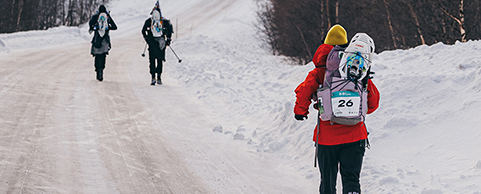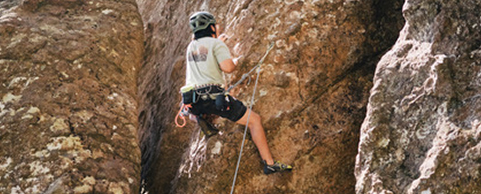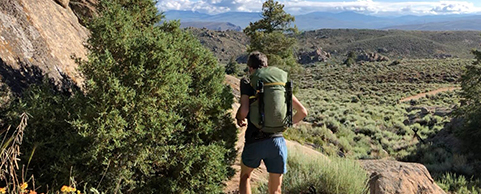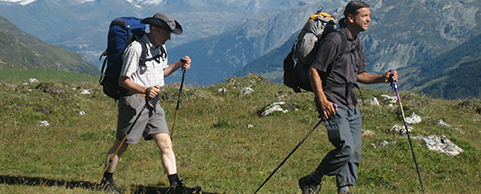Winter Hiking: What You Need to Know
Extreme winter hiking in Tasmania's Western Arthurs. Photo: David Blundy.
Bushwalking in winter has lots of pluses. The air is crisp and clear, and the vegetation has a freshly washed hue. Your senses are heightened somehow and our wild places seem wilder. And with good gear, there is nothing quite like the feeling of being warm and snug in your tent while the weather rages outside.
But, when temperatures drop and days get wetter, hiking can get challenging. Slippery terrain, white-out conditions and fewer daylight hours are just some factors.
So, apart from the usual things you need for a multiday bushwalk in summer, what are some extra points to consider when tackling a winter hike?
Things to Consider
1. The days are short.
In winter, you might get as little as eight hours of daylight – as opposed to up to 15 in summer. That means, fewer hours for walking.
Take this into account when planning your hike. Also, remember that your party might be slower than normal while negotiating wet terrain, or low visibility thanks to a thick fog that's rolled in.
2. Bring a spare headtorch.
Say, you think you'll reach your campsite in seven hours. But, you miscalculate, or your party is slow. Darkness falls, and you're discovering that navigating at night is exponentially harder. Suddenly, you're trudging in the dark and batteries in your headtorch are running out.
Something small (like the Petzl e+LITE) weighs nearly nothing. But, it's a spare that covers you not only for flat batteries, but also for the strap on your headtorch breaking.
3. You'll work up an appetite.
Pack extra food. You don't need excessively more. About 20% more than you would usually pack for a multiday walk would be fine. The idea is that you're taking extra fuel for extra energy you'll burn to stay warm.
In our Food for Hiking article, we suggest 800-900 grams of dehydrated food per day. In winter, that figure should be closer to 900g.
Pack an emergency meal. Not necessarily a full meal – say, a packet of soup and emergency deb (dehydrated mashed potatoes).
That way, if you need to camp an extra night unexpectedly, you've got something more substantial to eat than a chocolate block. Speaking of which...
BRING CHOCOLATE. Seriously, chocolate keeps you warm. Or any high-energy food, for that matter.
4. It'll be really cold after dark.
Bring a down jacket. The Mont Icicle is a beefy, super-toasty, insulated layer. The benefit of down is that it has a better warmth-to-weight ratio than synthetic fill. What's awesome about the Mont Icicle is that it comes with a hood. So, so warm.
Imagine that on a clear night, you're sitting under white stars after dinner. The ground's too damp to light a fire (or the park doesn't allow fires). But that's okay, because you're admiring the milky way, cozy-warm in your down jacket.
5. Stay as dry as you can.
Wear waterproof and quick-drying clothing. In jeans and a cotton T-shirt, you're only about an hour or two away from hypothermia. Once cotton gets wet, it stays wet for a long time. And winters in Victoria and Tasmania are rainy, so you will get wet.
You'll stay drier (and, hence, warmer and happier) in clothes designed to be worn in misty rain and lively wind. A good rain jacket is a must, as is a pair of quick-drying pants. (See our full clothing recommendations list below.)
6. Double, triple waterproof your essential gear.
Your sleeping bag is something you really don't want to get wet. Bogong owner Neil Blundy double-bags his sleeping bag, even in summer.
That means, he puts his sleeping bag into a waterproof stuff sack, then packs it into another stuff sack. A raincover for your pack adds another layer of waterproofing.
7. Bring a down sleeping bag.
It's going to be really cold. But, don't worry – with a good sleeping bag, you can stay toasty warm at night, no matter how cold it gets.
Our advice is, bring a sleeping bag that's rated for colder weather than you think you'll encounter. Why? Because if you're too warm, it's easy enough to unzip your sleeping bag. But, if you're too cold, there's no much you can do about it.
Also, the weather might be colder than forecast. Or, your sleeping bag might get damp. Having a warmer bag in either of these cases will make you more comfortable.
What's more, if you're tired, sick or not eating well, it's harder for your body to stay warm. So, for many reasons, a warmer sleeping bag than you think you need is a good idea.
Remember, night-time lows can range from 0 degrees Celsius to -5 in most parts of Victoria, depending on where you go. On Mt Hotham, it can get to -11.
8. Opt for a full-length, warm sleeping mat.
Any part of your body in direct contact with the ground will get cold. A good quality down mat provides comfort and warmth.
A Therm-a-Rest coupled with a foam mat would be perfectly fine, and warm enough, also. But, you can sleep like a king on an Exped downmat. (Which is nice after a hard day's slog in a winter storm.)
Random tips...
- Consider taking a PLB.
- Bring chocolate.
- Also, hot chocolate.
- Stash your head torch in your rucksack's inside top pocket. (It's easy to get to and easy to remember where it is.)
- Lighting in your tent is a worthwhile luxury.
- A Grivel Bubble Mat weighs nearly nothing, and it's good for sitting or kneeling on. Your bum won't get cold. Plus, it provides cushioning. Also, use it to extend your sleeping mat.
- Synthetic thermals (like Mont PowerDry) dry quicker than wool.
- A good pair of softshell gloves (Rab Velocity Glove) isn't waterproof, but will cut wind. A leather palm helps you grab your hiking poles and branches. Also, gloves like the Velocity aren't as bulky and awkward as ski gloves.
In Summary...
It may be more challenging than walking in summer months, but cold-weather hiking is rewarding. Bluebird winter days are blissful, and even stormy weather can produce an atmospheric, memorable journey.
Clothes to Bring
What exactly you wear during the day depends on weather, but here's an idea of clothes you might bring on a multiday bushwalk in winter:
- Waterproof boots
- 2-3 pairs of socks (e.g. MUND Makalu)
- Thermal leggings (e.g. Mont PowerDry)
- Bushwalking pants (nylon)
- Waterproof, breathable overpants
- Optional extra: Fleece pants, for around camp, if it's really cold.
- Waterproof gaiters
- Undies
- Softshell gloves (e.g. Rab Velocity Glove)
- Thermal top (e.g. Mont PowerDry)
- Bushwalking shirt (fully synthetic, long-sleeved collared shirt, e.g. Mont Lifestyle Vented Shirt)
- Insulating layer (light polar fleece)
- Down jacket (e.g. Mont Icicle)
- Good quality hardshell jacket
- Beanie
- Sunhat
- GORE-TEX hat (e.g. Outdoor Research Seattle Sombrero)
- Optional extra: Another midlayer, such as a synthetic-fill jacket (e.g. RAB Xenon X Hoody) or 200-weight fleece. You can wear it in the daytime and have it as an extra layer in the evening.
Questions? Visit us, email us or call us (03 9600 0599).
More Articles
- WESTERN ARTHURS IN WINTER
- A SNOWY WALK – LAKE ST CLAIR TO CRADLE MOUNTAIN
- WHICH IS THE BEST DOWN SLEEPING BAG?



















